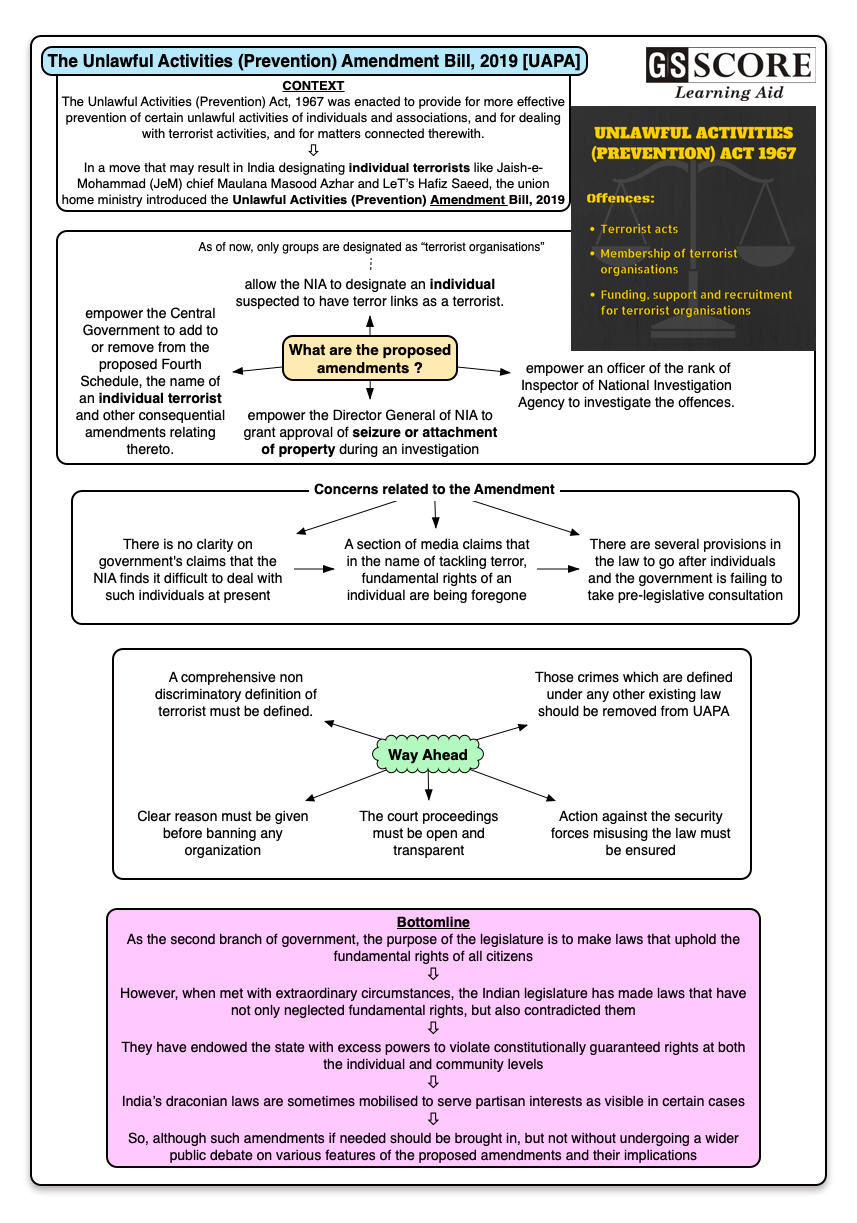

In a move that may result in India designating individual terrorist like Jaish-e-Mohammad (JeM) chief Maulana Masood Azhar and LeT’s Hafiz Saeed, the union home ministry introduced the Unlawful Activities (Prevention) Amendment Bill, 2019
Issue
Context
In a move that may result in India designating individual terrorist like Jaish-e-Mohammad (JeM) chief Maulana Masood Azhar and LeT’s Hafiz Saeed, the union home ministry introduced the Unlawful Activities (Prevention) Amendment Bill, 2019
Background
- The Unlawful Activities (Prevention) Act, 1967 (the Act) was enacted to provide for more effective prevention of certain unlawful activities of individuals and associations, and for dealing with terrorist activities, and for matters connected therewith.
- The said Act has been amended in the years 2004, 2008 and 2013 to add certain provisions relating to various facets of terrorism.
- Its main objective is to make powers available for dealing with activities directed against the integrity and sovereignty of India.
- The Unlawful Activities (Prevention) Amendment Bill, 2011 was introduced to make it more effective in preventing unlawful activities, and meet commitments made at the Financial Action Task Force (an intergovernmental organization to combat money laundering and terrorism financing).
- It expands the definition of ‘terrorist act’ to Acts that threaten the economic security of India and damage its monetary stability by production, smuggling or circulation of ‘high quality’ counterfeit currency. The security features that define ‘high quality’ are laid down in the Third Schedule.
Analysis
- Presently, the National Investigation Agency faces many difficulties in the process of investigation and prosecution of terrorism related cases.
- With a view to overcome such difficulties being faced by the National Investigation Agency in the investigation and prosecution of terrorism related cases due to certain legal infirmities.
- Also to align the domestic law with the international obligations as mandated in several Conventions and Security Council Resolutions on the issue.
- will allow the Central government to designate individual terrorist and bring in embargo on arms/assets seizures.
- The individual however can appeal against the inclusion of his/her name and seek a hearing before the review committee, constituted by the Central government under UAPA.
- The provisions, similar to UN sanction is used by the Security Council to apply pressure on a State or entity to comply with the objectives set by the UN without resorting to the use of force.
- The designation, offer Security Council an important instrument to enforce its decisions. As per UN, when a person is designated as a global terrorist under the UN 1267 ISIL and Al-Qaeda Sanctions Committee, a travel ban is imposed on the subject.
Main features of the bill
- Amendment to Schedule 4 of the Bill will allow the NIA to designate an individual suspected to have terror links as a terrorist. As of now, only groups are designated as “terrorist organisations”.
- Empowering the Director General, National Investigation Agency to grant approval of seizure or attachment of property when the case is investigated by the said agency.
- Amending section 35 of the Act to empower the Central Government to add to or remove from the proposed Fourth Schedule, the name of an individual terrorist and other consequential amendments relating thereto.
- Inserting a new clause (ba) in section 43 of the Act to empower an officer of the rank of Inspector of National Investigation Agency to investigate the offences.
- The government believed in “zero tolerance” towards terrorism and a provision is needed to designate “individual terrorist” in law.
Concerns of the bill
- It is been claimed that in the name of tackling terror, fundamental rights of an individual are been foregone.
- There is no clarity on government's claims that the National Investigation Agency (NIA) finds it difficult to deal with such individuals at present and demanded the government can’t keep the House in the dark on the so-called difficulties.
- There are several provisions in the law to go after individuals and the government is failing to take pre-legislative consultation.
|
Unlawful Activities (Prevention) Act
Prevention of Terrorism Act, 2002
|
Unlawful Activities (Prevention) Act and Democracy
- As the second branch of government, the purpose of the legislature is to make laws that uphold the fundamental rights of all citizens.
- However, when met with extraordinary circumstances, the Indian legislature has made laws that have not only neglected fundamental rights, but also contradicted them.
- they have endowed the state with excess powers to violate constitutionally guaranteed rights at both the individual and community level.
- Usually, these unconstitutional laws are designed with a protectionist rhetoric against a threat.
India’s draconian laws are sometimes mobilised to serve partisan interests.
- ‘National Security’ Laws to Suspend Fundamental Rights
- Detaining Kashmiris in the Name of ‘Public Safety’
- ‘Anti-Terrorism’ Laws to Repress Dissent
- Terrorism Laws to Target Minorities and Marginalised Groups
Way forward
- A comprehensive non discriminatory definition of terrorist must be defined.
- Those crimes which are defined under any other existing law must be removed from UAPA.
- The court proceeding must be open and transparent.
- Clear reason must be given before banning any organization.
- Action against the security forces misusing the law must be ensured.
Learning Aid



